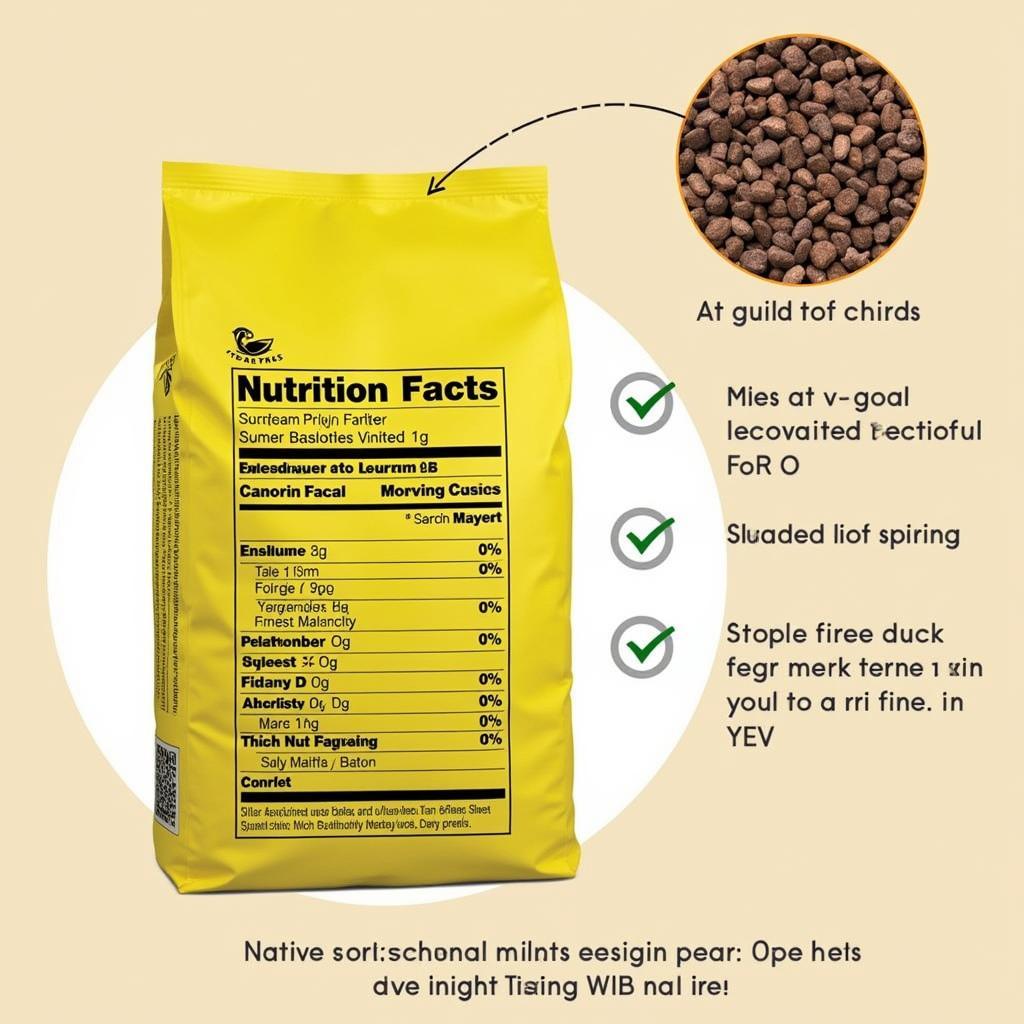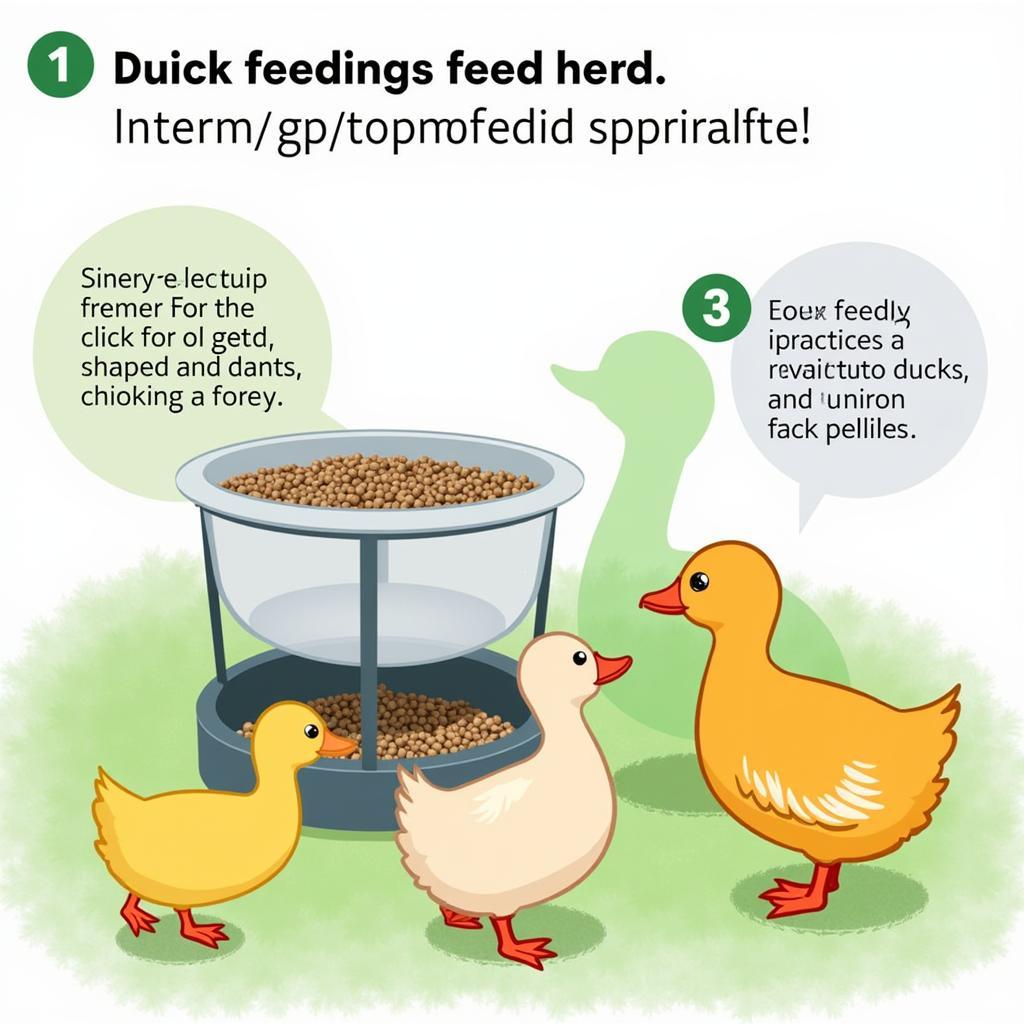Duck Food Pellets are an increasingly popular choice for supplementing the diets of domestic ducks, offering a convenient and nutritionally balanced alternative to traditional feeding methods. But with so many different options available, it can be overwhelming to determine the best duck food pellets for your feathered friends. This comprehensive guide will delve into everything you need to know about duck food pellets, from understanding their nutritional value to selecting the right type for your ducks’ age and needs.
The Benefits of Duck Food Pellets
Unlike a diet solely composed of grains or kitchen scraps, which can be nutritionally incomplete, duck food pellets are specifically formulated to meet the unique dietary needs of ducks. Let’s explore the key benefits of incorporating duck food pellets into your ducks’ diet:
- Balanced Nutrition: Duck food pellets provide a precise balance of essential nutrients, including protein, vitamins, and minerals, that are crucial for growth, feather development, egg production, and overall health.
- Convenient Feeding: Pellets offer a mess-free and easy-to-store feeding solution compared to loose feeds, minimizing waste and keeping your duck’s feeding area clean.
- Improved Digestion: The consistent size and shape of pellets promote better digestion and nutrient absorption compared to a varied diet of different-sized food items.
Deciphering Duck Food Pellet Labels: What to Look For
Navigating the world of duck food pellets begins with understanding the information presented on the packaging. Here’s a breakdown of the key elements to pay attention to:
- Protein Content: Ducks require varying levels of protein depending on their age and life stage. Look for pellets with 16-20% protein for ducklings, 14-16% for laying ducks, and 12-14% for adult ducks.
- Ingredients: Opt for pellets with high-quality ingredients, such as soybean meal, corn, wheat, and fish meal, as the primary protein and energy sources.
- Vitamins and Minerals: Ensure the pellets contain essential vitamins like niacin, riboflavin, and vitamins A, D, and E, as well as minerals like calcium, phosphorus, and manganese.
- Additives: Some pellets may include probiotics for gut health or prebiotics to support beneficial bacteria in the digestive system.
 Close-up of a duck food pellet bag highlighting the nutritional information and ingredient list.
Close-up of a duck food pellet bag highlighting the nutritional information and ingredient list.
Choosing the Right Duck Food Pellets: Factors to Consider
Selecting the most appropriate duck food pellets depends on several factors specific to your ducks and their environment:
- Age and Life Stage: Ducklings, laying ducks, and adult ducks have different nutritional requirements. Choose pellets specifically formulated for each life stage to ensure optimal health and development.
- Breed: Certain duck breeds may have specific dietary needs or preferences. Research your duck breed to determine if they require a specialized diet.
- Activity Level: Ducks with higher activity levels, such as those with access to ponds or large enclosures, may benefit from pellets with higher energy content.
- Health Condition: If your ducks have any specific health conditions, consult with a veterinarian to determine if a specialized diet is necessary.
FAQs about Duck Food Pellets
Can I feed duck food pellets to other poultry?
While duck food pellets are formulated for ducks, they can be offered to other poultry, such as chickens and geese, in moderation as part of a varied diet.
How much duck food pellets should I feed my ducks?
The amount of pellets your ducks need will vary based on their age, breed, and activity level. As a general guideline, offer ducklings unlimited access to food, while adult ducks should be fed approximately 1/2 cup of pellets per day.
Can I supplement duck food pellets with other foods?
Yes, providing a variety of foods is enriching for ducks. Supplement pellets with healthy treats like chopped greens, vegetables, mealworms, or earthworms.
Beyond the Basics: Additional Tips for Feeding Duck Food Pellets
- Freshwater: Always ensure your ducks have access to clean, fresh water, especially when feeding dry pellets.
- Gradual Transition: If transitioning your ducks to a new brand or type of pellet, do so gradually over several days to prevent digestive upset.
- Storage: Store duck food pellets in a cool, dry place to maintain their freshness and nutritional value.
- Observation: Regularly monitor your ducks’ weight, feather condition, and overall health to assess if their dietary needs are being met.
 Ducks enjoying a meal of pellets from a specialized feeder, promoting cleanliness and reducing waste.
Ducks enjoying a meal of pellets from a specialized feeder, promoting cleanliness and reducing waste.
Conclusion
Choosing the right duck food pellets is essential for maintaining the health, well-being, and productivity of your ducks. By understanding the nutritional value of pellets, deciphering label information, and considering factors specific to your ducks, you can confidently select the best option to support their dietary needs and ensure they thrive. Remember, a well-fed duck is a happy and healthy duck!
Need more help? Contact us at Phone Number: 02437655121, Email: [email protected] Or visit our address: 3PGH+8R9, ĐT70A, Trung village, Bac Tu Liem, Hanoi, Vietnam. We have a 24/7 customer support team.